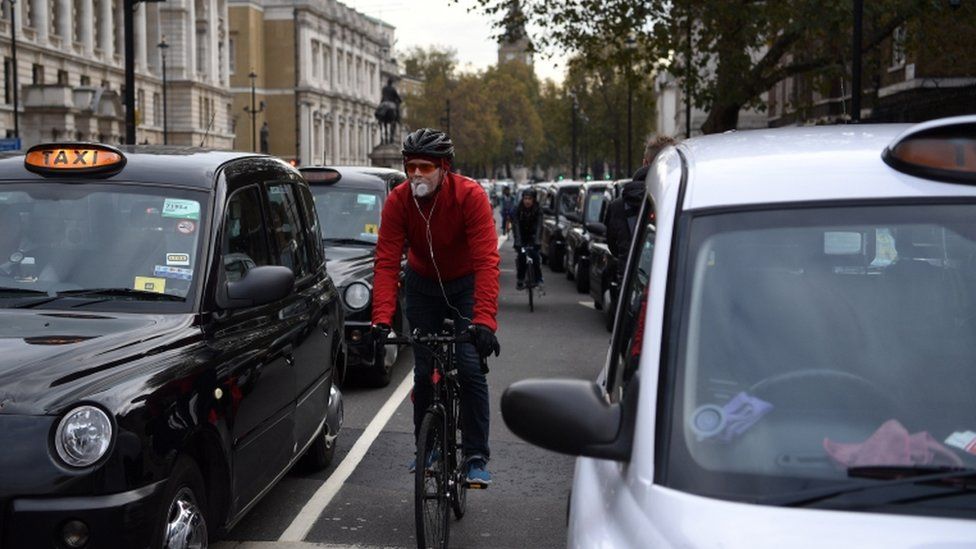Coronavirus: London congestion charge brought back with price rise
- Published
- comments

The congestion charge for people driving into central London will be reintroduced on Monday under the terms of a £1.6bn government bailout.
It follows a deal in which Transport for London (TfL) secured emergency funding to keep Tube and bus services going until September.
From 22 June, the congestion charge will also rise from £11.50 to £15.
Downing Street defended the changes saying it "only applied to a small area of central London".
The prime minister's official spokesman said roads in these areas "would come to a halt without it" and it was an "important tool to ensure that emissions in London remain low and support better air quality".
'Last resort'
TfL said the resumed congestion charge would be temporarily extended to between 07:00 and 22:00, seven days a week, from 22 June and the price rise would be in place for a year.
Both measures will be reviewed later to see if they are made permanent.
A system of reimbursement for NHS workers in place before the charge was suspended on 23 March will also be extended to care home workers.
Coronavirus: How to socially distance on public transport
Mayor of London Sadiq Khan said the measures were designed to avoid a build up of traffic after the government urged people returning to work to avoid public transport.
TfL said the plans would "create more space for social distancing when walking and cycling, ensuring that the people who have no choice but to return to work in central London can do so as safely as possible".
Some streets will be converted to walking and cycling only, with others restricted to all traffic apart from buses, creating "one of the world's largest car-free zones".
Waterloo Bridge and London Bridge may be restricted to people walking, cycling and buses only, with pavements widened to enable people to safely travel between busy railway stations and their workplaces.
Mr Khan warned public transport must only be used "as a last resort".
The low emission zone and ultra low emission zone - imposing levies on high-polluting vehicles - also comes back into operation on Monday.
'Land grab'
Also under the conditions of the government deal, children will no longer have free travel across London and restrictions on travel passes for people with a disability or over the age of 60 will also be imposed during peak hours.
Fares on buses - scrapped to help protect drivers from Covid-19 - will also be reintroduced.
The Department for Transport (DfT) said these changes would be put in place "as soon as practicable".
Allow Twitter content?
This article contains content provided by Twitter. We ask for your permission before anything is loaded, as they may be using cookies and other technologies. You may want to read Twitter’s cookie policy, external and privacy policy, external before accepting. To view this content choose ‘accept and continue’.
Allow Twitter content?
This article contains content provided by Twitter. We ask for your permission before anything is loaded, as they may be using cookies and other technologies. You may want to read Twitter’s cookie policy, external and privacy policy, external before accepting. To view this content choose ‘accept and continue’.
Black-cab driver and general secretary of the London Taxi Drivers' Association (LTDA) Steve McNamara said it was "an absolute disgrace" no one had been consulted about plans to change the use of some roads.
"Usually you have to consult with the public and businesses - they are using a health emergency to get around the laws to consult people before you do these things," he said.
"It's a land grab to exclude Londoners from their roads and to widen pavements for more cycling."
Mr Khan said the government deal was necessary because coronavirus had had a "catastrophic impact on TfL's finances".
"I want to be completely honest and upfront with Londoners," the mayor said.
"This is not the deal I wanted. But it was the only deal the government put on the table and I had no choice but to accept it to keep the Tubes and buses running."
The DfT also announced TfL will introduce fare rises of 1% above the rate of inflation from next year.
Natalie Chapman, of the Freight Transport Association, said the congestion charge hike "ignored the needs of London businesses".
She added: "How are shops to be supplied, restaurants and cafes to be stocked and the rest of the capital's economy to obtain the products it needs when those charged with delivering these needs are to be punitively taxed at a time when their own industry is in recovery?"
Analysis
By Tom Edwards, BBC London transport correspondent
The old adage in promoting cycling and walking or active travel is you have to make driving cars horrible - and that is certainly what's happening here.
These are radical changes to London's streets. If you want to drive around central London be prepared not to be allowed in certain roads and to pay £15 a day.
Drivers fear gridlock. But cycling and walking advocates will be rejoicing that parts of the city are being given over to them.
The other side story here is the political row between the government and the Mayor and the many strings attached to the bailout.
Future infrastructure is up in the air and fare rises will happen in January.
Sadiq Khan says he won't be able to be the mayor he wants to be and Londoners are being punished. Ultimately the powers and autonomy of a devolved region has just been weakened.
- A SIMPLE GUIDE: How do I protect myself?
- LOOK-UP TOOL: Check cases in your area
- MAPS AND CHARTS: Visual guide to the outbreak
- STRESS: How to look after your mental health
- Published14 May 2020
- Published12 May 2020
- Published22 April 2020
- Published21 April 2020